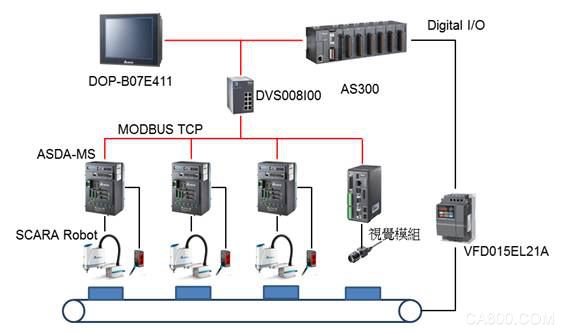Background of the project
With the sustained and rapid economic development, China's automobile, communications, electric power, railway transportation, information, radio and television and other industries have maintained a high-speed development trend, and the demand for lead-acid batteries has been increasing, which has greatly promoted the development of the lead-acid battery industry. It is expected that in the next few years, the lead-acid battery industry will have an annual growth of about 10%.
In the production of lead-acid batteries, it is difficult to avoid contact with lead, acid, and other substances. Long-term work will harm the body and production needs will be more automated. At the same time, the continuous increase in market size will also require increased production efficiency. A company adopts Delta SCARA industrial robots to carry out assembly of small components in battery production lines, such as taking and placing battery poles, gluing small batteries, and using O-rings, flat pads, and screw-pressed parts to the battery poles. Columns are sealed and plastic caps are added at the acid injection port to replace the manually operated production process with an automated solution to easily solve efficiency problems while also saving production costs.
Project proposals
The project is equipped with three Delta SCARA industrial robots on a lead-acid battery assembly line, and the O-rings, flat pads and threaded pressure pads are assembled separately. The entire assembly line uses Delta's programmable controller (PLC) AS300 series as master control, touch and display with human-machine interface DOP-B07E411, and signal transmission through industrial Ethernet switch DVS008I00 through the timely transmission of the assembly of each SCARA industrial robot. Signal, real-time monitoring of lead-acid battery assembly status. The assembly line uses the PLC's IO signal to control the start and stop of the inverter, and the visual system is used to filter the components. As shown in Figure 1.

Figure 1 System Architecture
The cover rubber cap station is an important step in the assembly process of the lead-acid battery. In this station, the battery is fixed by a fixed point, and the Delta SCARA industrial robot is also used for the operation. Due to the problem concerning production efficiency, the working time of the plastic cap for each battery must not exceed 6 s. To this end, Delta has redesigned tooling fixtures that are more in line with machining requirements and has significantly increased production efficiency.
The visual inspection of threaded pressure pads for monitoring and screening is also a very important part. This project adopts the Delta DV1000 industrial camera plus ring-shaped light source 80W solution. Through monitoring the result signal, it drives the pneumatic valve to do the rejection movement and controls the feeding of the vibration plate. Start and stop.
The assembly process of the entire project involves the following two difficulties:
1. It is necessary to determine the motion of the SCARA industrial robot grabbing the O-ring and placing it on the bottom of the copper pillar. The solution is to design the fixture as a retractable fixture while installing a contact sensor at the gap to use this signal to make a decision.
2, multi-task mode applications. When SCARA robots do O-ring grabbing and placing action, it is necessary to detect whether the material on the vibration plate is in place at all times. The arrival signal cannot be judged according to whether the robot stops in the waiting area, but it is always necessary to detect whether the object is in place. , And control the start and stop of the vibration disk, then we must use multitask command MultiTask.
Project summary
Delta's solution can optimize the detection of thread pressure pads and eliminate the sending of signals, improve product quality and assembly efficiency, and help users save costs.
At present, the user has made the SCARA stand-alone assembly into a standard control cabinet unit. Later in the application of other production lines, only the replacement of the tool head can adapt to a variety of application environments and the production of batteries of various specifications.
Antenk offers flat cables from its own production – the location of the in-house Flat cable production is the antenk factory in shenzhen,Made in China. The FLAT CABLES are produced with latest state of the art production facilities and fulfill the Automotive standards.
Flat cable is a standard organization and is suitable for mobile electrical equipment with AC rated voltage of 450v/70v and below. Flat structure is especially suitable for frequent bending occasions, without kinking and folding neatly, such as driving. Yb, YBF and YBZ products can meet the needs of various occasions. It is suitable for the electrical connection between mobile electrical equipment in the harsh environment of power generation, metallurgy, chemical industry, port and so on.
Flat Cable
ShenZhen Antenk Electronics Co,Ltd , https://www.antenksocket.com
